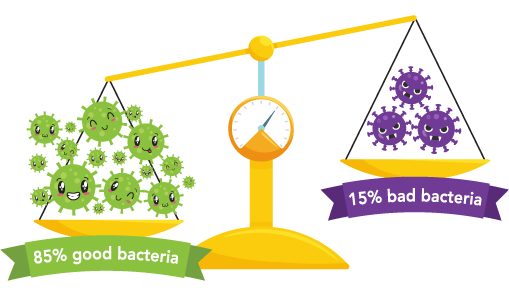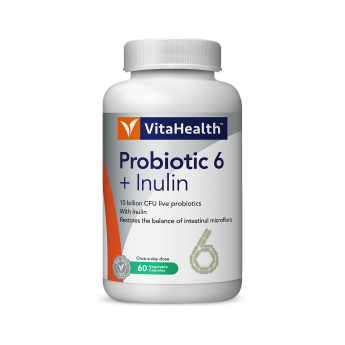Your gut microbiota contains approximately 1-2kg or 100 trillion bacteria from about 1000 different types of species. In fact, these bacteria are ten times more than the number of cells of your entire body!
The delicate balance of gut microbiota
Bacteria are not all bad. Most of the bacteria are good and you need them to maintain good health. It is of the utmost importance to keep a correct balance between the good and bad bacteria.
Ideally, the colony of microflora should be composed of a ratio of 85% good bacteria to 15% bad bacteria. The key is to promote the growth of good bacteria while reducing the amount of the bad.

What disrupts the gut microbiota?
The delicate balance of gut microbiota can be disrupted by numerous factors such as:
- Stress
- Poor dietary choices
- Use of antibiotics
- Lack of exercise
- Smoking
- Alcohol consumption
When your body does not have enough good bacteria, bad bacteria can thrive. An imbalance of gut microbiota, often due to lack of good bacteria or an overgrowth of bad bacteria, can negatively affect your well-being. Here are some signs to look for:
- Constipation, diarrhea or bloating
- Fatigue or sluggishness
- Mood swings
- Skin problems like eczema
- Poor concentration
- Unexplained weight changes
Probiotic + prebiotic = synbiotic
There are hundreds of varying strains of bacteria in a healthy gut, with specific strains benefiting certain parts of the gastrointestinal tract. Lactobacilli strains reside in the small intestines while Bifidobacteria settle predominantly in the colon.
Probiotics work synergistically with prebiotics, non-digestible fibers that feed the good bacteria, stimulating their growth and activity in your gut. Inulin is one of the best-known examples of prebiotics. Combining probiotics and prebiotics in a powerful synergy, known as synbiotic, can optimise the beneficial effects of both.
Gu health
Probiotics have been shown to promote digestion and optimise the absorption of nutrients. They stimulate the enzymatic activities which break down the food you ingest. In the colon, probiotics promote regular bowel movements to eliminate the detrimental waste and toxins from your body. Good digestive health will ultimately relieve a number of digestive conditions including gas, bloating, flatulence and abdominal discomfort. Probiotics also help alleviate the symptoms of lactose intolerance.
Immune defence
Your gut and your immune system are closely linked. Housing 80% of your body’s immune cells, your gut plays a vital role as the first line of defence against infections. Probiotics reinforce the integrity of the gut barrier, providing an extra level of defence against infectious bacteria and other triggers from entering the bloodstream. By establishing colonies of good bacteria in the gut, probiotics help discourage the less friendly bugs which otherwise the immune system would have to deal with.
What makes a good probiotic supplement?
Not all probiotics strains are created equal. To ensure the quality and efficacy, look for a probiotic formula which is:
- High strength
- Made with multiple strains for synergistic benefits
- Resistant to stomach acid, bile and antibiotics to survive the stomach and intestinal transit
- Stable at room temperature during their storage throughout their shelf life
- In the form of capsules so the bacteria are protected from air, moisture and other contaminants
- Added with prebiotic to stimulate growth and activity of good bacteria
Maintaining a balanced gut microbiota
Tending to the bacteria in your gut is an ongoing process. Supplementing with probiotics offers a fast and effective way to replenish the good bacteria.
Remember, you can only achieve good health when your body is able to effectively absorb and utilise the essential nutrients from what you eat and eliminate the metabolic by-products and toxins from the body.






